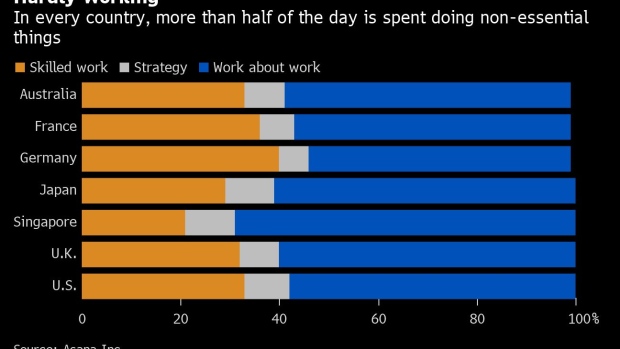More Than Half of the Working Day Is Spent Kinda, Sorta Working
, Bloomberg News

(Bloomberg) -- The pandemic has forever altered many aspects of work, but there’s one thing it hasn’t changed -- how much time we spend just shuffling paper around.
White-collar workers devote more than half their day to “work coordination,” which includes following up on things, searching for information and communicating about work, according to a survey by business software maker Asana Inc. While there are regional differences -- Germans devote a bit less of their day to such mundane tasks than Americans -- the results are broadly similar across the globe: Only about a third of the workday is spent doing what we were actually hired to do, and that hasn’t changed much since 2019.
“The workday has become complex enough that we have to spend more time just managing work and a host of competing priorities rather than actually doing work,” said Melissa Swift, U.S. transformation solutions leader at workforce consultant Mercer. “Many, many meetings are wholly performative.”
The global survey of more than 10,600 so-called knowledge workers -- data analysts, graphic designers and the like -- also found that the amount of time spent on strategy, or planning ahead, declined to 9% last year from 13% in 2019. That’s due in part to the difficulties of getting disparate, often asynchronous teams together at the same time, Asana said.
But it could also be because many companies found long-term forecasting difficult amid a global pandemic and its impact on office life.
“The decline in strategic work was striking,” Anne Raimondi, Asana’s chief operating officer, said in an interview. “Leaders have been much more in reaction mode lately.”
While more than half of the working day is soaked up by nonessential tasks, variations do exist around the globe. Germans devote more of their day to doing their actual job than other nationalities, but they also spend the least amount of time on strategic planning. Workers in Japan and Singapore, meanwhile, led the pack with 10% of their time going to strategy, but those two nations also spent the most time coordinating work.
Swift, the Mercer consultant, said companies have tried to reduce the amount of time spent on coordination, without much success. The number of meetings, for example, increased by 70% during the pandemic, according to Reclaim.ai Inc., which makes an app that syncs calendar programs. Neither Mercer nor Reclaim.ai was involved in the Asana survey.
“It’s tricky,” Swift said. “Folks are genuinely loath to admit they’re doing performative work with literally zero value.”
©2022 Bloomberg L.P.

No comments:
Post a Comment